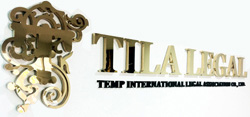
If you wish to buy Thailand property, TILA Legal with our English speaking lawyers and years of experience dealing with the expat community can assist you in a successful and secure property transaction. Our team will quickly assess your needs and recommend to you the best course of action for your stay in Thailand.
How to buy Land / House in Thailand Information:
Foreigners can not own land in their own name in Thailand. A Thai woman married to a foreigner can own property in her name. Foreigners, by consulting with a Thai lawyer, can form a company which can own land and property. The company issues shares, of which the foreigner owns 39% - and the foreigner is designated as the Director of the company.
How to buy Condominium in Thailand Information:
The rules for selling or purchasing Condos will change April 27, 2004. After that date, if more than 49% of the Condominium units in a Condo building are owned by foreigners, Thai persons cannot sell their unit in that building to a foreigner and put in a foreigners own name. Foreigners can sell their units to anyone - the restriction applies only to Thai persons. The current rule allowing foreigners to own up to 100% was a special waiver of the "old" rule limiting foreigner ownership to 49%, was put into place during the currency crisis, and was renewed each year. That "special waiver" was not renewed this year.
Types of land title deeds in Thailand:
- Chanote - the Best! Allows Ownership & Possession Rights.
- Nor Sor 3 (Sam) Gor - Second Best, it is documented with (aerial) airplane photography by the government, but allows only possession, but can made directly into Chanote at the land office.
- Nor Sor 3 (Sam) - Old system replaced by Nor Sor 3 (Sam) Gor, to be made into Chanote must be made into Nor Sor 3 (Sam) Gor first.
- Tor Tor 3 (Sam) - Be Careful! Squatter's rights apply, it can not be sold by the land register office, only between persons.
OWNERSHIP RIGHTS VS POSSESION (SQUATTERS) RIGHTS
The essential difference between the Chanote and the other three documents is that only the Chanote allows both possession rights and ownership rights, while the other documents allow only possession rights. A Chanote is the best title deed to have as the property is fully surveyed, can be sold, passed onto heirs, and all the other benefits given to full title holders.
If you buy land in thailand that does not have a chanote or Nor Sor 3 (Sam) Gor, anyone may claim possession rights - if they occupy the property for as short a period of time as just one year and the title is a Tor Tor 3 (Sam) they can claim possession. A Tor Tor 3 (Sam) title deed can not be registered at the Land Office. Ownership can be contested if the Tor Tor 3 (Sam) owner does not occupy the land or does not put a fence around the land to keep out squatters who may try to claim possession. Property with title deeds that are not chanotes can be sold and passed on to heirs by a legal will or other rights.
If the title deed is a Chanote, the property must be occupied by a squatter for at least ten years, not one year as in some of the other documents, to gain possession. As long as the owner occupies or uses the property within the 10-year period, full ownership will be protected under Thai law.
However, the Nor Sor 3 (Sam) Gor is much more exact in terms of survey and measurement of the property than all types but chanotes. The Tor Tor 3 (Sam) is the weakest of the documents and is generally regarded as 'squatter's rights' land. Never accept any property for sale with a Tor Tor 3 (Sam) if you are not a Thai citizen.
FREEHOLD VS. LEASEHOLD LAND - Attention Condo Buyers!
In addition to the different types of land title deeds, you should check to see what type of ownership applies to the property, particularly for condominiums.
Be sure to check how long the lease is on the land on which your condo is located!
Freehold means that you own the property outright. You can buy, sell, trade, and leave the property free and clear to your heirs and there is no worrying about an expiring land lease if your condo building is on the land.
Leasehold means that although you can buy a condo within a building where leasehold conditions apply, you may only have rights to the property underlying the condo for the period of the lease. The land owner where the building stands retains ownership rights of the property - and only leases out the land to the owners of the condo. Leases generally are for a 30-year period. Sometimes the lease contract may specify that the lease can be renewed for a further 30 year period. A leasehold property may be bought, sold and traded, but you may not leave the property to your heirs to own in perpetuity.
